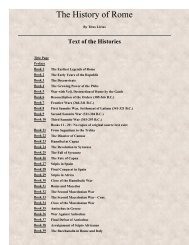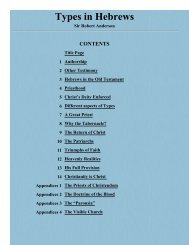The Person of the Holy Spirit - Table of Contents
The Person of the Holy Spirit - Table of Contents
The Person of the Holy Spirit - Table of Contents
Create successful ePaper yourself
Turn your PDF publications into a flip-book with our unique Google optimized e-Paper software.
More important from a practical standpoint than <strong>the</strong> inquiry as to <strong>the</strong> nature <strong>of</strong> <strong>the</strong> conception <strong>of</strong> Christ are <strong>the</strong> conclusions<br />
relative to <strong>the</strong> nature <strong>of</strong> His humanity. Here we deal not with speculation but with revelation, and <strong>the</strong> conclusions reached<br />
are <strong>of</strong> great importance in determining <strong>the</strong> doctrine <strong>of</strong> His <strong>Person</strong>. While it is not possible to discuss <strong>the</strong> intricacies <strong>of</strong> <strong>the</strong><br />
doctrine <strong>of</strong> <strong>the</strong> hypostatic union, attention may be directed to <strong>the</strong> humanity <strong>of</strong> Christ, resulting from <strong>the</strong> work <strong>of</strong> <strong>the</strong> <strong>Holy</strong><br />
<strong>Spirit</strong>, that humanity which was joined inseparably without confusion or loss <strong>of</strong> its true humanity to <strong>the</strong> Second <strong>Person</strong> <strong>of</strong><br />
<strong>the</strong> Trinity.<br />
(1) <strong>The</strong> Elements <strong>of</strong> <strong>the</strong> Humanity <strong>of</strong> Christ. <strong>The</strong> Scriptures make it clear that <strong>the</strong> humanity <strong>of</strong> Christ included all <strong>the</strong><br />
essential elements. Christ possessed a true body, composed <strong>of</strong> flesh and blood and all <strong>the</strong> normal human functions (Heb<br />
2:14). <strong>The</strong> immaterial factors <strong>of</strong> soul (Matt 26:38; Mark 14:34; John 12:27; Acts 2:27) and spirit (Mark 2:8; 8:12; Luke<br />
23:46; John 11:33; 13:21) are included in His humanity. It may be conceded that some <strong>of</strong> <strong>the</strong> characteristics <strong>of</strong> His body<br />
were temporary and were abandoned after His death in <strong>the</strong> glory <strong>of</strong> His resurrection, but this argument has no bearing on <strong>the</strong><br />
validity and completeness <strong>of</strong> His humanity. Only <strong>the</strong> characteristics <strong>of</strong> <strong>the</strong> body were subject to change, and this also<br />
followed <strong>the</strong> pattern <strong>of</strong> all flesh in that Christ died and in resurrection received a spiritual body, <strong>the</strong> pattern <strong>of</strong> those who will<br />
be raised in Him. <strong>The</strong> Scriptures make it clear, <strong>the</strong>n, that Christ did not take to Himself in <strong>the</strong> incarnation a human body<br />
which was indwelt by deity, but that ra<strong>the</strong>r He took to Himself a human nature and body. He did not simply possess a<br />
human body, but He possessed a human nature. Yet, in <strong>the</strong> incarnation, Christ did not take possession <strong>of</strong> a human person,<br />
else He would have had dual personality. As Charles Hodges says, “<strong>The</strong> Son <strong>of</strong> God did not unite Himself with a human<br />
person, but with a human nature. <strong>The</strong> pro<strong>of</strong> <strong>of</strong> this is that Christ is but one person.”10 It may be concluded that <strong>the</strong><br />
Scriptures demand that <strong>the</strong> humanity <strong>of</strong> Christ be complete, and any o<strong>the</strong>r viewpoint is a serious departure from revealed<br />
truth.<br />
(2) <strong>The</strong> Human Nature Was Without Sin. In contrast to all o<strong>the</strong>r human beings, Christ was without sin both in His immaterial<br />
and His material being. This was essential to <strong>the</strong> hypostatic union as it is inconceivable that deity could be united with<br />
humanity in one <strong>Person</strong> if this would involve sin. While <strong>the</strong> attributes <strong>of</strong> <strong>the</strong> divine nature do not transfer to <strong>the</strong> human<br />
nature and <strong>the</strong> attributes <strong>of</strong> <strong>the</strong> human nature never transfer to <strong>the</strong> divine nature, <strong>the</strong> attributes <strong>of</strong> ei<strong>the</strong>r nature may be<br />
attributed to <strong>the</strong> <strong>Person</strong> <strong>of</strong> Christ. <strong>The</strong>refore, if <strong>the</strong> human nature were sinful, <strong>the</strong> <strong>Person</strong> <strong>of</strong> Christ would have this<br />
characteristic. It is essential to every important doctrine that <strong>the</strong> <strong>Person</strong> <strong>of</strong> Christ be sinless and to this <strong>the</strong> Scriptures give<br />
abundant testimony (Isa 53:9; John 8:46; 2 Cor 5:21; Heb 4:15; 7:26; 1 Pet 1:19; 2:22; 1 John 3:5). <strong>The</strong> sinlessness <strong>of</strong> <strong>the</strong><br />
human nature is a result <strong>of</strong> <strong>the</strong> work <strong>of</strong> <strong>the</strong> <strong>Holy</strong> <strong>Spirit</strong> in conception, as we have seen, <strong>the</strong> humanity being kept from all sin.<br />
(3) <strong>The</strong> Human Nature Partook <strong>of</strong> Unmoral Limitations. While guarded from every taint <strong>of</strong> sin, <strong>the</strong> human nature <strong>of</strong> Christ<br />
partook <strong>of</strong> <strong>the</strong> limitations true <strong>of</strong> humanity. This involved on <strong>the</strong> part <strong>of</strong> <strong>the</strong> human nature that it was temptable and<br />
peccable, even though <strong>the</strong> <strong>Person</strong> <strong>of</strong> Christ was impeccable. <strong>The</strong> human nature lacked omniscience, omnipotence,<br />
omnipresence, and infinity which <strong>of</strong> course characterized <strong>the</strong> divine nature. <strong>The</strong> body <strong>of</strong> Christ had all <strong>the</strong> normal feelings<br />
and emotions which are natural to humanity except those arising in a sin nature. <strong>The</strong>re was nothing lacking to His humanity<br />
which was essential to it, and <strong>the</strong>re was nothing added to His humanity which was unusual, apart from <strong>the</strong> divine nature<br />
itself. <strong>The</strong> human nature <strong>of</strong> Christ was very similar to that <strong>of</strong> Adam’s before <strong>the</strong> fall, <strong>the</strong> great difference being found in its<br />
union with <strong>the</strong> divine nature.<br />
(4) Christ Was <strong>of</strong> <strong>the</strong> Seed <strong>of</strong> David. While <strong>the</strong> birth and conception <strong>of</strong> Christ involved many unusual factors, and while we<br />
do not understand how all <strong>the</strong>se elements were produced, <strong>the</strong> fact is clear that Christ was born <strong>of</strong> <strong>the</strong> seed <strong>of</strong> David as<br />
Mary’s true son. His was <strong>the</strong> lineage <strong>of</strong> David as to His humanity, and probably <strong>the</strong> racial characteristics <strong>of</strong> Israel were<br />
evident in <strong>the</strong> body <strong>of</strong> Christ apart from sin. Christ was never accused <strong>of</strong> not being a true Israelite as far as His race was<br />
concerned. It is essential to all <strong>the</strong> purpose <strong>of</strong> God in fulfilling His promises to David that Christ should be <strong>of</strong> his seed. On<br />
this hangs <strong>the</strong> fulfillment <strong>of</strong> <strong>the</strong> propheeies relating to <strong>the</strong> millennial kingdom and God’s purpose relative to <strong>the</strong> earth. <strong>The</strong><br />
viewpoint that <strong>the</strong> humanity <strong>of</strong> Christ was effected creatively does not exclude this aspect, but ra<strong>the</strong>r includes all <strong>the</strong> natural<br />
features related to His conception and birth.<br />
<strong>The</strong> record <strong>of</strong> Scripture does not satisfy in every respect <strong>the</strong> natural curiosity <strong>of</strong> an inquiring mind into <strong>the</strong> various factors <strong>of</strong>








